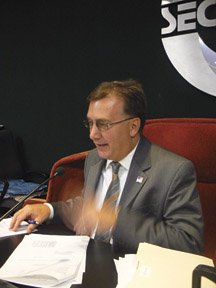There’s a tax revolt brewing in the New Jersey Meadowlands.
In an effort to protest a regional tax-sharing law town officials believe is unfair and outdated, Secaucus is poised to withhold a $2.6 million payment due to the state of New Jersey. The payment, due May 1, would represent Secaucus’ 2011 contribution to the Meadowlands District’s tax-sharing pool.
Regional tax-sharing was established to compensate the municipalities that were barred by the state from developing environmentally sensitive parts of the Meadowlands. Towns like Secaucus that were allowed to develop would contribute so that towns that couldn’t develop would be compensated.
Secaucus is one of 14 towns that come under the jurisdiction of the New Jersey Meadowlands Commission (NJMC), a state agency founded to plan and oversee regional development in the Meadowlands District. Since the 1960s, six municipalities in the Meadowlands District have been zoned for uses that do not generate much tax revenue – such as parks – while others, like Secaucus, were zoned for office space, which generate ample tax revenue.
Secaucus is not alone in withholding its payment this year. Local officials in two other Meadowlands municipalities – Moonachie and Carlstadt – confirmed last week that they, too, will withhold their payments from the tax pool.
“Hardly any legislators in Trenton know what it’s about.” – Michael Gonnelli
____________
For years, under former Mayor Dennis Elwell, Secaucus retained paid lobbyists to fight this cause in Trenton, to no avail. More recently, under the current mayoral administration of Michael Gonnelli, the town has worked directly with North Jersey legislators to end tax-sharing. Although some headway has been made within the last year, tax sharing still remains a reality.
The protest, which was spearheaded by Moonachie Mayor Dennis Vaccaro, is now the latest and perhaps most radical attempt to abolish tax sharing.
“I think we all feel that the day of tax-sharing has come and gone,” said Gonnelli. “There was a time when it was a good thing for Secaucus because we benefitted from regional state planning and we received a lot of ratables. But your ratable base only grows by the amount of property you have left. And we don’t have a lot of property left to develop. Those days are gone.”
Thus, last Tuesday the Secaucus Town Council passed a resolution asking Gov. Christopher Christie and the state legislature to explore “alternative funding sources” for the Meadowlands region. Parking surcharges and fees on entertainment events in the Meadowlands are among the sources recommended in the resolution.
The resolution, which was originally drafted by officials in Moonachie, states that “all payments to the [tax-sharing] fund [will] be held in abeyance” until this matter is addressed by the legislature.
Not paying!
Secaucus taxpayers currently contribute $2.6 million annually to the Meadowlands tax-sharing pool, and the town is the largest contributor in the district. In the past annual payments were sometimes as high as $3 million. Secaucus has contributed more than $68 million to the pool since 1973, when the tax-sharing formula went into effect.
Moonachie, Carlstadt, Little Ferry, Lyndhurst, South Hackensack, and North Bergen are the other municipalities that contribute.
East Rutherford, North Arlington, Ridgefield, Rutherford, Jersey City, and Kearny receive money from the pool. Teterboro, which is also part of the Meadowlands District, neither contributes nor receives money from the tax-sharing pool.
The mayors of the towns that pay into the pool argue that the money they give to the district is needed locally to offset municipal tax increases, particularly given the state’s new 2 percent property tax cap.
Legislative bills proposed in both the state Senate and Assembly have been stalled for at least five years, in part, Gonnelli said, because most state reps know nothing about the issue.
“Our legislators in this area know about tax sharing. But all you have to do is drive down the Turnpike a little bit and nobody knows what it’s about,” he said. “Hardly any legislators in Trenton know what it’s about. We’re going to hold back our payment to try to bring some attention to this.”
Legislation sponsored last year by Assemblyman Vincent Prieto (D-32 Dist.) and State Sen. Sandra Cunningham (D-31st Dist.) passed budget committees in both houses, but never gained enough support or momentum for passage before the full assembly or senate.
Will there be consequences?
A spokesman for the NJMC said on Wednesday that the state “has not received any formal notification of this action.”
Gonnelli acknowledged the controversial move could have consequences.
When asked what specific consequences the town might face, Michael Witt, an attorney with Chasan, Leyner, Lamparello who attended last week’s Town Council meeting in place of usual Town Attorney Anthony D’Elia, said, “There could be penalties for withholding or for making a late payment. It’s a general proposition that you don’t have the right to address a grievance by taking it upon yourself to redress the grievance.”
The NJMC spokesman said, “Obligations for payment into the fund are mandatory. Because there has been no formal notification that any municipality has refused to make payment, it would be premature to discuss potential consequences.”
E-mail E. Assata Wright at awright@hudsonreporter.com.
